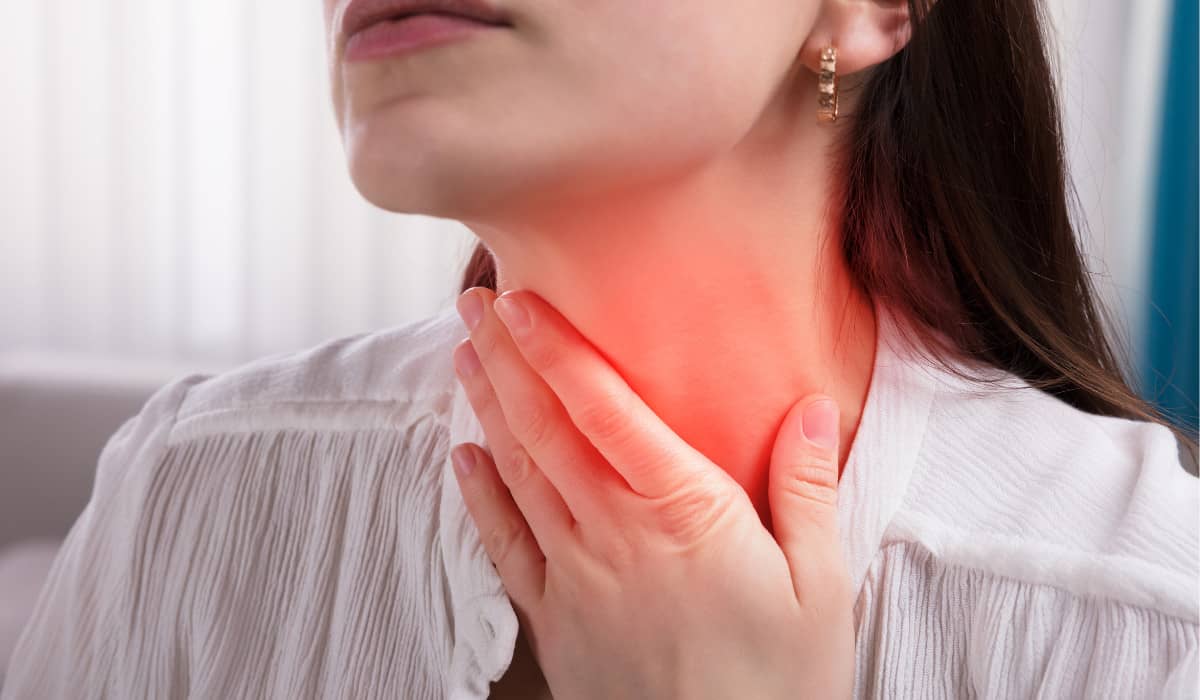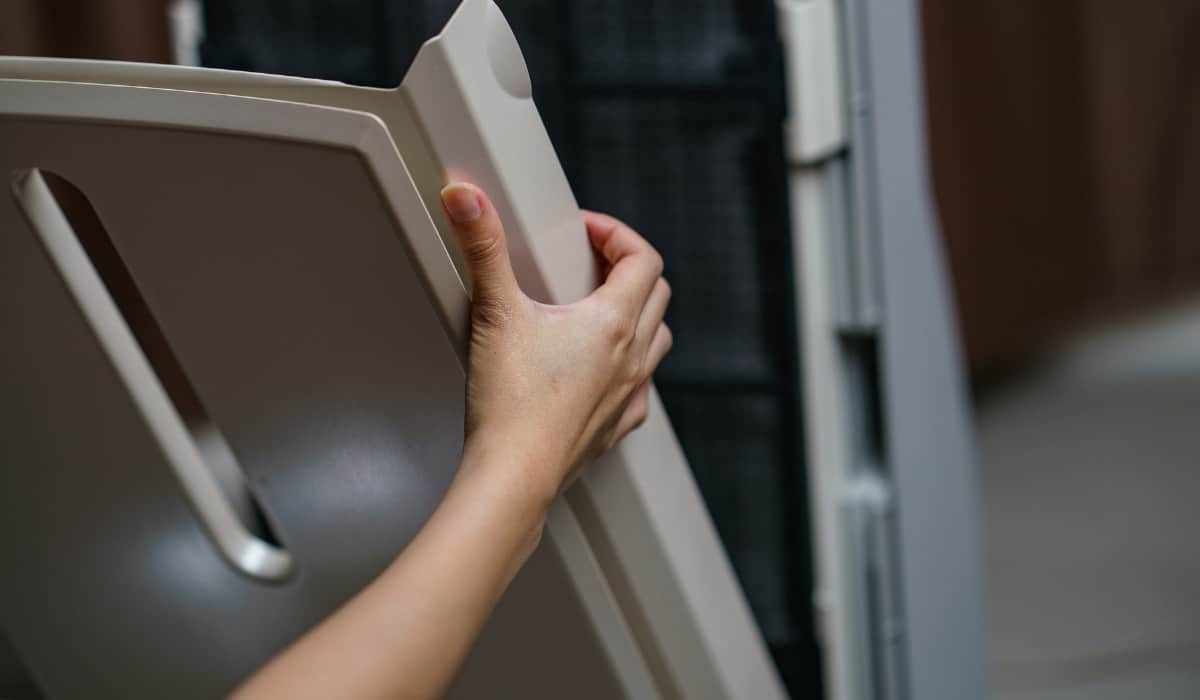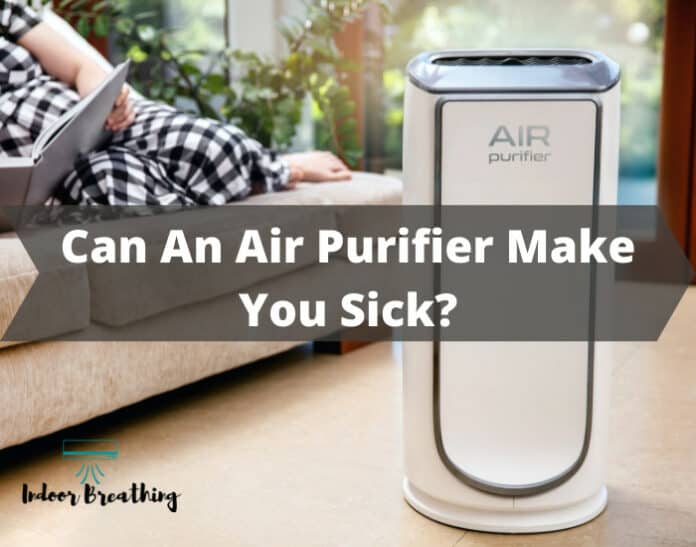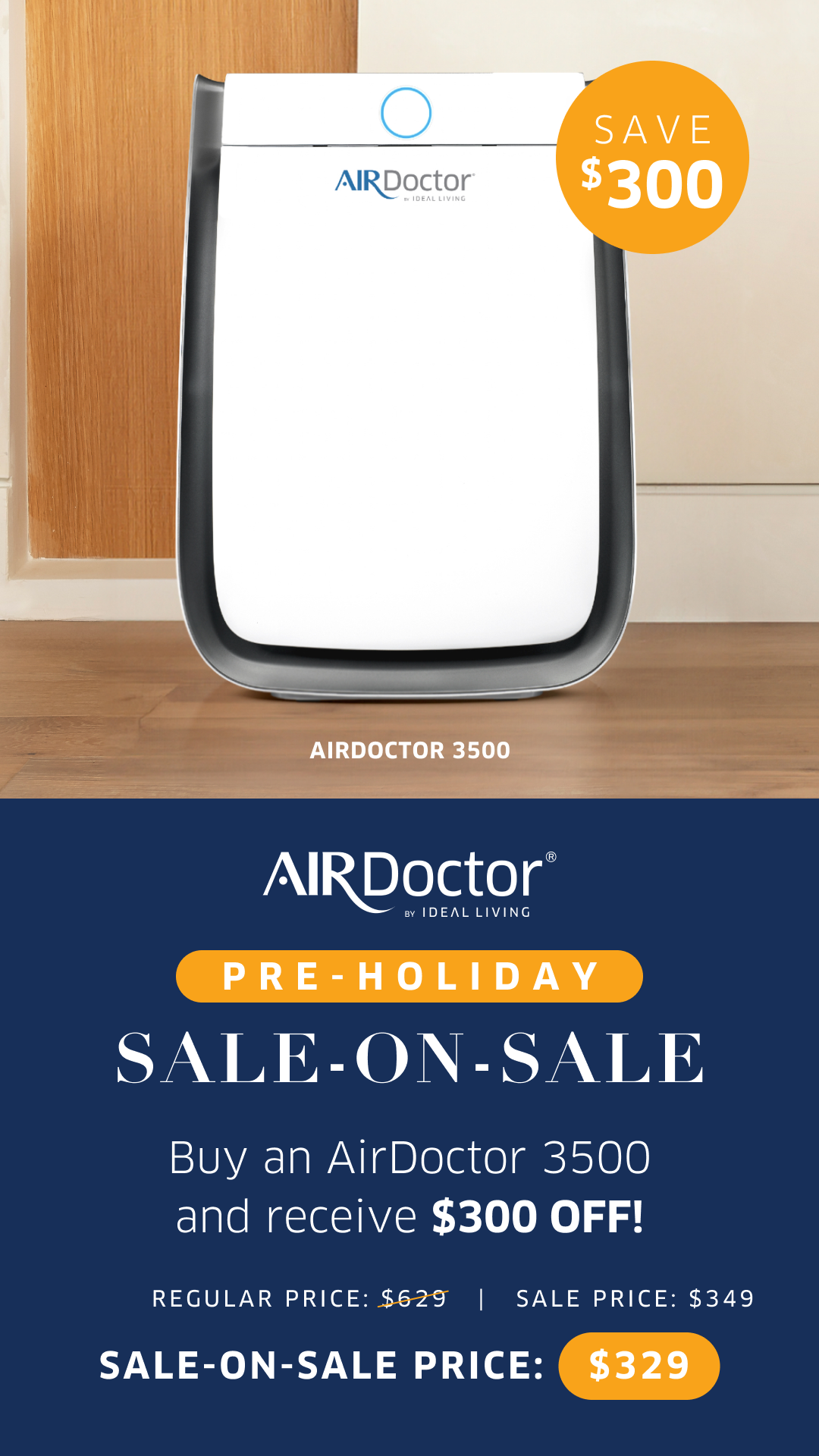Many people have started using air purifiers in their homes. It has especially been the case in the recent few years. The demand for these units is because people want to improve the air quality in their homes.
It makes you think, has the air quality gone so bad that people have started to use these air purifiers? Various factors can influence the answer to this question.
But the rise in air pollution across the globe is the primary reason. Of course, we can’t control the air quality outdoors. But we can certainly control it inside our homes using these air purifiers.
Plenty of research has been done to determine how effective these units are. While no one denies the benefits, some have also asked whether these units can make you sick.
And in this guide, we will shed some light on this particular aspect of air purifiers, whether they make you sick or not.
But this surge in popularity begs the question: Has air quality deteriorated to the point where air purifiers have become a necessity? The simple answer is yes. Global air pollution levels have been rising steadily, contributing to various health issues such as respiratory problems, cardiovascular diseases, and allergies. While controlling outdoor air quality is a challenging task involving complex policies and international cooperation, improving indoor air quality is within our grasp, and air purifiers offer a practical solution.
Table of Contents
The Effectiveness of Air Purifiers
Numerous studies have been conducted to evaluate the effectiveness of air purifiers. These devices are designed to remove contaminants from the air, including dust, pollen, pet dander, mold spores, and even bacteria and viruses. High-efficiency particulate air (HEPA) filters, in particular, are known for their ability to capture particles as small as 0.3 microns with an efficiency of 99.97%. This makes them highly effective at reducing airborne pollutants that can trigger asthma, allergies, and other respiratory conditions.
Additionally, some air purifiers are equipped with activated carbon filters that can absorb volatile organic compounds (VOCs) and odors, further enhancing indoor air quality. UV light purifiers and ionizers are also available, which can kill germs and neutralize pollutants.
Can Air Purifiers Make You Sick?
While the benefits of air purifiers are well-documented, some concerns have been raised about their potential to cause adverse health effects. This guide aims to shed light on whether air purifiers can indeed make you sick.
Ozone-Generating Air Purifiers
One of the primary concerns revolves around ozone-generating air purifiers. Ozone, a molecule composed of three oxygen atoms, is a powerful oxidant and can be harmful to health. High levels of ozone can cause respiratory irritation, exacerbate asthma, and reduce lung function. While some air purifiers intentionally produce ozone to disinfect the air, the potential health risks have led to increased scrutiny and regulation. It’s crucial for consumers to avoid ozone-generating air purifiers or to ensure that the ozone levels remain within safe limits as recommended by health authorities.
Maintenance and Filter Replacement
Another factor to consider is the maintenance of air purifiers. Neglecting to change or clean filters regularly can lead to the accumulation of pollutants, which can then be released back into the air, potentially causing more harm than good. Dirty filters can also become breeding grounds for mold and bacteria, which can be detrimental to health. Therefore, following the manufacturer’s maintenance guidelines is essential to ensure the air purifier operates effectively and safely.
Allergic Reactions
Some individuals might experience allergic reactions to the materials used in air purifiers, such as certain plastics or adhesives. However, these cases are relatively rare and can often be mitigated by choosing air purifiers made from hypoallergenic materials.
Are Air Purifiers Safe to Use?
These units work by removing harmful allergens and other airborne particles from indoor air. Their designs enable them to suck in unfiltered air and make it pass through a filter. As a result, clean and filtered air comes out.
These units can be handy for anyone suffering from allergies, asthma, or other health issues. Most quality units available on the market come with HEPA filters. HEPA stands for high-efficiency particulate air, and these filters meet strict efficacy standards.
For an air purifier unit to qualify as a HEPA filter in the US, it must be able to remove up to 99.97 percent of any particle down to 0.3 microns. The percentage must also go up when the particle size increases or decreases.
Air purifiers and filters don’t let us inhale dirty air. And if a unit cannot do this, it is not HEPA-approved.
Benefits of Air Purifiers
Air purifiers can be particularly beneficial for individuals suffering from allergies, asthma, or other respiratory issues. They are designed to eliminate particles that can exacerbate these conditions, providing a cleaner and healthier breathing environment.
Most quality air purifiers on the market come equipped with HEPA filters. HEPA stands for High-Efficiency Particulate Air, and these filters adhere to stringent efficacy standards. In the United States, a filter must remove 99.97% of particles as small as 0.3 microns to qualify as a HEPA filter. The efficiency typically increases with larger or smaller particles, providing comprehensive air cleaning.
Safety and Effectiveness
When considering the safety of air purifiers, it’s essential to understand their function and design. The primary role of an air purifier is to prevent the inhalation of dirty air, thus enhancing indoor air quality. Quality air purifiers, especially those with HEPA filters, are designed to meet high safety and performance standards.
However, it’s crucial to ensure that the air purifier you choose is certified and meets the necessary safety standards. An uncertified or poorly manufactured unit may not effectively filter the air, failing to provide the benefits associated with true HEPA filters.
Considerations for Safe Use
- Certification and Standards: Always verify that the air purifier is certified and meets HEPA standards. This ensures that the unit can effectively remove harmful particles from the air.
- Regular Maintenance: To maintain the efficiency and safety of your air purifier, replace filters as recommended by the manufacturer. Clogged or dirty filters can impede performance and reduce air quality.
- Ozone Emission: Be cautious of air purifiers that produce ozone, as it can be harmful to health. Opt for units that do not generate ozone or those that produce it at safe levels.
- Placement: Position the air purifier in an area where it can efficiently circulate air without obstruction. Avoid placing it near walls or large furniture that might block airflow.
Does An Air Purifier Dry Out Air?
Contrary to what most people think, air purifiers don’t dry the air. They are not designed to alter humidity levels in the air. These units can only filter out air through their system. They are not equipped to capture moisture from the air.
One of the reasons you have dry air in your home is your air conditioner. And to resolve this problem, some people go for an air humidifier. A humidifier is a unit that moistens the air and increases humidity which counteracts dry air from the air conditioner.
When it comes to drying out the air, dehumidifiers are the units that are equipped to alter humidity levels in the air inside our homes. They can reduce moisture in the air, but an air purifier is not equipped to do this.
How Air Purifiers Work
Air purifiers are equipped with filters, often including HEPA (High-Efficiency Particulate Air) filters, that trap particulates as air passes through the device. Some models may also include activated carbon filters that can absorb odors and gases. However, none of these components are designed to extract moisture from the air. Therefore, the air that exits an air purifier has the same humidity level as the air that enters it.
Common Misconceptions
The misconception that air purifiers dry out the air may stem from the association of air purification with air conditioning systems. Air conditioners, unlike air purifiers, do have an impact on humidity levels. They work by cooling the air, which causes moisture to condense out of the air, thus reducing humidity. This is why air-conditioned environments often feel dry.
Addressing Dry Air
If dry air is a concern, it is typically due to the use of air conditioning or heating systems that reduce indoor humidity levels. To combat this, many people use humidifiers. A humidifier adds moisture to the air, increasing humidity and making the indoor environment more comfortable, especially during the winter months when heating systems can significantly dry out indoor air.
Dehumidifiers vs. Air Purifiers
It’s important to differentiate between air purifiers and dehumidifiers. Dehumidifiers are specifically designed to reduce humidity levels by extracting moisture from the air. They collect the water in a reservoir or drain it out, thus lowering the humidity in the room. This function is entirely different from that of an air purifier, which only filters and cleans the air without affecting its moisture content.
Do Air Purifiers Make You Sick?
No, an air purifier doesn’t make you sick on its own.
But people have been asking this question for a long time, and we will find out the truth about whether these units make you sick or not.
Sore throat

With a HEPA-certified air purifier, sore throat cannot be an issue. These units work to get rid of bacteria from indoor air. Therefore, they assist in reducing any occurrences of sickness or sore throats.
These units are also effective in eliminating any allergens. They can work like a charm if you palace them in your bedroom to assist in getting a peaceful sleep.
However, if you own an ionizing air purifier, you might experience throat irritation. It is because air ionizers can work slightly differently from HEPA-approved air purifiers.
These units don’t take in air for the filtering process. They emit charged particles to clean air instead. And as a byproduct, these units also create a bit of ozone. While the amount of ozone produced by these units is meager, it is more than enough to cause minor throat irritation and respiratory issues.
With a HEPA-certified air purifier, sore throat cannot be an issue. These units work to get rid of bacteria from indoor air. Therefore, they assist in reducing any occurrences of sickness or sore throats. These units are also effective in eliminating any allergens. They can work like a charm if you place them in your bedroom to assist in getting a peaceful sleep.
However, if you own an ionizing air purifier, you might experience throat irritation. It is because air ionizers can work slightly differently from HEPA-approved air purifiers. These units don’t take in air for the filtering process. They emit charged particles to clean the air instead. As a byproduct, these units also create a bit of ozone. While the amount of ozone produced by these units is meager, it is more than enough to cause minor throat irritation and respiratory issues.
Headaches
Among the most commonly asked questions is, do air purifiers cause headaches? Again, if you have a HEPA-certified air purifier, it should not be an issue as these units are designed to remove harmful allergens, odors, and mold spores that might cause pain in the head.
But you must consider placing your air purifier at an appropriate location. If you plan properly, you will notice that air quality will significantly improve.
You will notice that you won’t even have trouble using those ionizing units. The amount of ozone these units produce is not enough to cause headaches.
Nosebleeds
This is an unsubstantiated claim, no matter what air purifier you use in your home. Apart from any underlying medical conditions, dry air can cause nosebleeds. The claim that air purifiers cause nosebleeds is unsubstantiated. Nosebleeds are often caused by dry air or underlying medical conditions, not by the use of air purifiers. Air purifiers do not dry out the air; their primary function is to filter out contaminants, not alter humidity levels. Therefore, it is unlikely that an air purifier would trigger nosebleeds.
But we have already established that air purifiers cannot dry out air because they are not equipped in such a manner. Therefore, they cannot trigger nosebleeds in any manner.
Cough
Similar to nosebleeds, if you breathe dusty or dry air, it might cause a sore throat and result in coughing. But with an air purifier working in the room that can remove allergens and various other irritants, there is a significant chance that your coughing is reduced dramatically. So, air purifiers cannot cause coughing.
Breathing in dusty or dry air can lead to a sore throat and result in coughing. However, an air purifier that removes allergens and other irritants from the air can significantly reduce coughing. Thus, air purifiers are more likely to alleviate coughing than cause it.
Ensuring That Air Purifier Doesn’t Make You Sick
While air purifiers alone cannot make you sick, they might if various other factors are combined. We are listing down a few hints for you to follow to prevent this from happening.
Avoiding ozone-producing air purifiers
With overexposure to ozone gas, results can be quite dangerous. It can cause coughing, wheezing, and tightening of the chest. And even in some extreme cases, it can prove to be fatal. Even a tiny amount of ozone can cause inflammation in your lungs and throat.
So, it is best to avoid these ozone-producing air purifiers no matter how effective they claim to be. Your best option is to go for HEPA-certified air purifiers. These units do not produce ozone gas.
Changing or cleaning your filters
Having dirty filters in your air purifying unit can be as bad as not having a filter at all. To make sure your appliance remains handy and effective in removing any contaminants and pollutants, you must change or clean the filter regularly according to the instructions provided to you by the manufacturer in the owner’s manual of your air purifying unit.
No matter which type of air purifier you are using. It comes with maintenance instructions, and you must change or replace the filters after a certain time. If you don’t do that, your air purifier will not work as it should, leaving your indoor air with pollutants and contaminants.
Air purifiers have become increasingly popular as people seek to improve the air quality in their homes and workplaces. While air purifiers can significantly benefit your health by reducing pollutants and allergens, improper use or certain types of purifiers can potentially cause adverse effects. Here are some essential tips to ensure your air purifier enhances your well-being without making you sick.
Avoiding Ozone-Producing Air Purifiers
One of the most critical steps in choosing an air purifier is to avoid those that produce ozone. Ozone generators are sometimes marketed as air purifiers, but they can pose serious health risks. Overexposure to ozone gas can cause a range of respiratory issues, including coughing, wheezing, and chest tightness. In severe cases, high levels of ozone exposure can be fatal.
Even low levels of ozone can be harmful, leading to inflammation in the lungs and throat. Therefore, it is crucial to steer clear of ozone-producing air purifiers, regardless of the effectiveness they claim. Instead, opt for HEPA-certified air purifiers, which are designed to filter out particulate matter without emitting harmful ozone gas.
Proper Maintenance and Filter Replacement
An air purifier can only function effectively if it is well-maintained. Dirty or clogged filters not only reduce the efficiency of the purifier but can also harbor mold, bacteria, and other pathogens. Regularly replacing or cleaning filters according to the manufacturer’s instructions is essential to ensure that your air purifier continues to work effectively and does not contribute to indoor air pollution.
Choosing the Right Size and Placement
Selecting an air purifier that matches the size of your room is crucial. An undersized purifier may not effectively clean the air, while an oversized unit may circulate air too quickly, reducing its ability to filter out pollutants. Additionally, proper placement of the air purifier is important. It should be placed in an area where air can circulate freely and away from obstructions like furniture or curtains.
Monitoring Indoor Air Quality
Invest in a good indoor air quality monitor to keep track of pollutant levels in your home. This will help you understand the effectiveness of your air purifier and make any necessary adjustments. Some advanced air purifiers come with built-in air quality sensors that adjust the purifier’s settings automatically to maintain optimal air quality.
Ventilation and Humidity Control
While air purifiers can significantly reduce indoor pollutants, they should not be the sole method for maintaining good air quality. Ensuring proper ventilation and controlling indoor humidity levels are also crucial. High humidity can promote mold growth, while low humidity can cause respiratory discomfort. Using dehumidifiers or humidifiers in conjunction with your air purifier can help maintain a balanced indoor environment.
Avoiding Chemical Cleaners
Using chemical cleaners in the same room as your air purifier can introduce volatile organic compounds (VOCs) into the air, which can be harmful when inhaled. Opt for natural cleaning products and ensure that any cleaning activities are done in well-ventilated areas to minimize the accumulation of harmful chemicals in the air.
Regularly Check for Recalls and Safety Certifications
Ensure that your air purifier is certified by relevant health and safety authorities, such as AHAM (Association of Home Appliance Manufacturers) or CARB (California Air Resources Board). These certifications indicate that the purifier meets stringent safety and performance standards. Additionally, stay informed about any recalls or safety notices related to your air purifier model to prevent potential health risks.
By following these guidelines, you can maximize the benefits of your air purifier and maintain a healthy indoor environment. Remember, while air purifiers are a valuable tool for improving air quality, they should be part of a comprehensive approach that includes regular cleaning, proper ventilation, and humidity control.
Using natural air purifiers in your home
Apart from these air purifiers, it would help if you also went for natural air purifiers in your home. And these are plants. Indoor air can contain pet dander, allergens, dust mites, and other irritants.
Air purifiers can be pretty effective, but they still can’t cover your entire home in one go. So, to achieve the best air quality at home, you can have natural air purifiers, and that are plants.
Some plants are excellent for absorbing harmful toxins from indoor air. They are highly effective in areas where there is not much airflow. For example, spider plants are suitable for this and easy to maintain.
Bamboo palms are even better, but you must take care of them. Both these plants are non-toxic and safe for households with kids and pets.
You can also use beeswax candles as natural air purifiers. These can burn very slowly and can produce very little smoke or smell. However, they are highly effective in neutralizing toxic compounds and removing harmful allergens from the air.
Indoor air quality is a crucial aspect of maintaining a healthy and comfortable living environment. While mechanical air purifiers are effective in filtering out pet dander, allergens, dust mites, and other irritants, they may not cover every corner of your home. To complement these devices, consider incorporating natural air purifiers—specifically, certain plants and beeswax candles.
The Power of Plants
Plants are not just aesthetically pleasing; they are also highly effective in purifying indoor air. Here are some top choices for natural air purification:
Spider Plants
Spider plants (Chlorophytum comosum) are excellent at absorbing pollutants such as formaldehyde, xylene, and toluene. These hardy plants thrive in various conditions and require minimal maintenance, making them perfect for those new to indoor gardening. They are particularly effective in areas with limited airflow, such as bathrooms or bedrooms.
Bamboo Palms
Bamboo palms (Chamaedorea seifrizii) are another fantastic option for improving indoor air quality. They excel at removing benzene, trichloroethylene, and formaldehyde from the air. However, they do require a bit more care compared to spider plants. Regular watering and indirect sunlight are essential to keep bamboo palms healthy. These plants are non-toxic, making them safe for households with children and pets.
Beeswax Candles
In addition to plants, beeswax candles can also serve as natural air purifiers. When burned, beeswax candles release negative ions. These ions bond with positively charged particles in the air, such as dust, pollen, and other pollutants, causing them to fall to the ground and effectively removing them from the air you breathe.
Beeswax candles burn slowly and produce very little smoke or scent, making them a cleaner alternative to paraffin candles. Their slow burn rate means they can purify the air for extended periods, contributing to a healthier indoor environment.
Combining Methods for Optimal Results
Using a combination of air-purifying plants and beeswax candles can significantly enhance your home’s air quality. Positioning plants in various rooms and burning beeswax candles periodically can ensure that different areas of your home receive continuous purification. This combined approach can create a fresher, healthier living space for you and your family.
Final Word

If you are dealing with any of the above-mentioned conditions or symptoms while at your home, there are chances that your air purifier is pretty slim or even non-existent.
Ensure you only go for HEPA-certified units and match the unit’s size with the coverage area. The quality of indoor air will significantly improve if you use a true HEPA-certified unit, and it will also assist in getting rid of any bad odors.
But air purifiers don’t alter humidity levels in the air. They are not equipped with such a mechanism, so they cannot dry out the air. So, that is not solely responsible for sore throat, cough, or nosebleeds.
In most cases, your air conditioner is the culprit because it produces dry air that can cause throat irritations and some respiratory issues.
Choosing the Right Air Purifier
When selecting an air purifier, it’s crucial to opt for HEPA-certified units. HEPA, which stands for High-Efficiency Particulate Air, certification guarantees that the unit meets specific standards for capturing fine particles, including dust, pollen, mold, and other airborne contaminants. Moreover, it’s important to match the unit’s capacity with the size of the coverage area. A unit designed for a smaller space will be less effective in a larger room, and vice versa.
Using a true HEPA-certified air purifier will substantially improve indoor air quality. These units not only capture airborne particles but also assist in eliminating unpleasant odors, making the indoor environment more pleasant and healthier.
Air Purifiers and Humidity Levels
It’s a common misconception that air purifiers can alter the humidity levels in the air. However, air purifiers are not equipped with mechanisms to control humidity and therefore cannot dry out the air. Consequently, an air purifier alone is not responsible for causing dry air symptoms such as a sore throat, cough, or nosebleeds.
The Role of Air Conditioners
In most cases, air conditioners (ACs) are the primary culprits behind dry indoor air. Air conditioners cool the air but also remove moisture, leading to lower humidity levels. Prolonged exposure to dry air can cause throat irritations and exacerbate respiratory issues. To mitigate these effects, consider using a humidifier alongside your air conditioner to maintain optimal humidity levels in your home.
Conclusion
Investing in a true HEPA-certified air purifier is an effective way to enhance indoor air quality and reduce the presence of allergens and odors. However, to address issues related to dry air, it’s essential to look beyond air purifiers and consider the impact of your air conditioning system. By balancing the use of air purifiers and humidifiers, you can create a healthier and more comfortable indoor environment.


